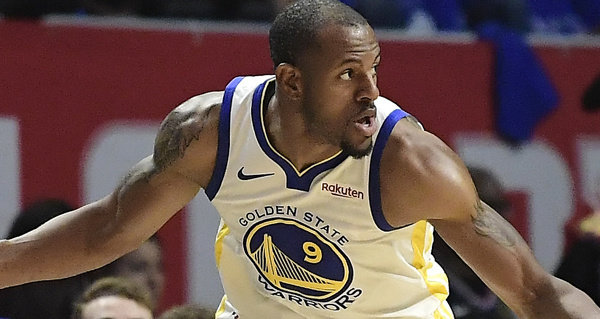There’s something beautifully honest about the fact that Andre Iguodala and the Memphis Grizzlies want nothing to do with each other. There’s no reason they should, with the Grizz in the thick of a rebuild and Iguodala 35 years old and unwilling to spend effort for anyone other than a title contender. Memphis brass are content to pay him and he’s content to stay away, waiting for an opportunity to play meaningful basketball in the spring.
Team and player interests typically don’t align this smoothly. Last season, in fact, Chandler Parsons had to force his way back onto the Grizzlies’ bench after nearly two months of being medically cleared for action. The Grizz had been trying in vain to trade him, and even after they failed to accomplish that at the deadline, they wanted him to collect his checks and keep his distance. Parsons might have agreed to that arrangement under different circumstances—it’s not like he was itching to suit up for one of the worst teams in the league—but he was coming to the end of his contract and wanted to prove he still had something left in his macerated knees. Ultimately, the Grizz were forced to accommodate Parsons, who played 22 awkward games for a franchise that had long since soured on him, and then he shuffled off stage left in a trade to Atlanta in July.
Iguodala and the Grizz are engaged in a more cordial standoff. They’re uneasy partners, having sniped at each other in the press over the offseason, but a few months back, they reached a sort of agreement. Iguodala won’t ask to play and Memphis won’t push him to do so. He’s a Grizzly in name only—working out on his own, apart from the team—until they can find a suitable home for him, securing what they hope will be a first round pick in the process. The Mavericks, Nuggets, Rockets, and both Los Angeles teams are all interested, but if Iguodala ends up on any of those squads, it likely won’t happen until the early February deadline, because the contenders in the market for Iguodala don’t want him so badly that they’re eager to give capital away.
Though he’s (probably) still a solid defender and (definitely) one of the smartest players in the league, he’s also at the stage of his career where each passing summer could represent the line of demarcation between him being a useful vet and a name with a body that’s entirely wrung out. Without having seen him on an NBA court since last season, it remains theoretical how much he’s declined over the past six months, and whether or not he’ll survive another deep playoff run. This is why no one in the ostensible bidding war for Iguodala’s services has made an actual bid. They’re all holding out to see if they can get him on the veteran minimum after the trade deadline passes. That’s a no-risk proposition any competitive franchise would be willing to make.
There’s no denying that this whole situation makes sense. Everybody involved in Iguodala's suspended animation season is acting rationally and reasonably, but there a depressing valence to this, which is all parties agreeing that it’s best not to try to make the relationship work. Iguodala is laughing at the idea of, like, at least sitting on the end of the bench and lending Memphis’s pair of 20-year-old lottery picks some wisdom—as if that’s beyond his $17 million pay grade. And the Grizz aren’t compelling him to because it’s not worth the headache—and besides, Iguodala has a different, more speadsheet-ish sort of value to them. It’s two sides telling the other to go to hell—you’re not worth my time vs. you’re just an asset to us—which is perhaps what a lot of business arrangements are like, at their core, but the mutual contempt, laid this bare, is unsettling.
As has been noted in the years since his firing, Sam Hinkie’s ideas about team-building were broadly astute. If your team doesn’t have any stars, it’s a completely viable option to work the math as hard as you can until you land a couple. There’s no prize for pretending you’re doing anything else. But the short-term product of Hinkie’s methods was a vaguely basketball team-shaped void. The 2014 Sixers were merely a notion of what the 2018 Sixers might be, and if that’s a particularly miserable, maybe ultimately ingenious way to run an NBA franchise, it’s a lousy way to live—purposefully destitute, numb, dimly exciting yourself with dreams of what might happen a few years down the line. What’s fruitful in the long run and what feels good in the meantime are two different things, and this is sports, not paying off a mortgage, so it’s not a little self-defeating to celebrate how everything being bad now means it will be better later.
This particular bit of absurdity will end soon. Iguodala will never play a game for the Grizzlies, and whether they get anything for him or not, he’ll be elsewhere in the spring, checking wings and launching corner threes for a playoff team. That all seems correct enough. It’s this sabbatical that’s discomfiting. It’s a kind of admission that for rebuilding organizations, very little matters, and there’s not much use expecting anything out of players whom you didn’t recently draft. It’s the kind of grim existential sentiment you expect to find in Guy de Maupassant, not on an SBNation team blog. But that’s how things work circa now, even in sectors as frivolous as professional sports. Everything is optimized, everything is getting better, even when it sure seems like nothing is happening at all.



